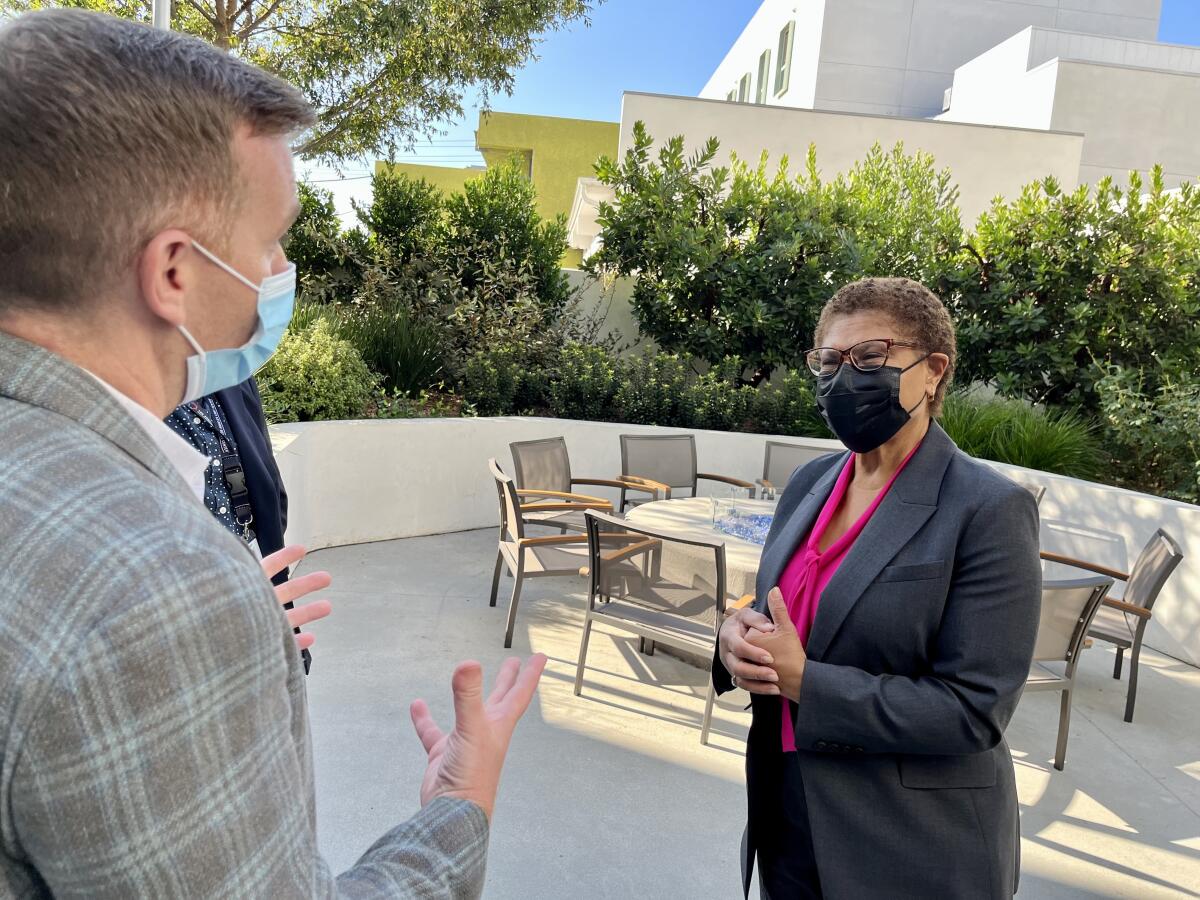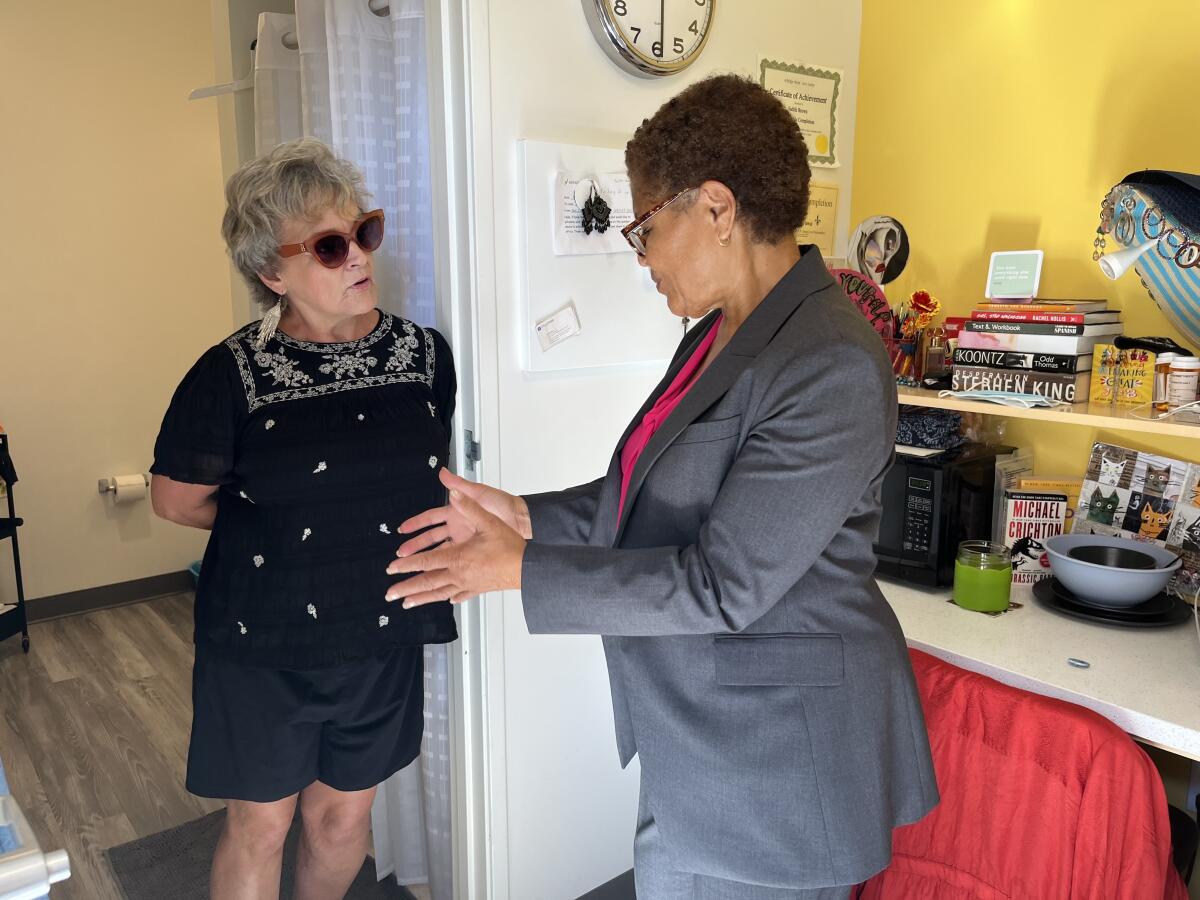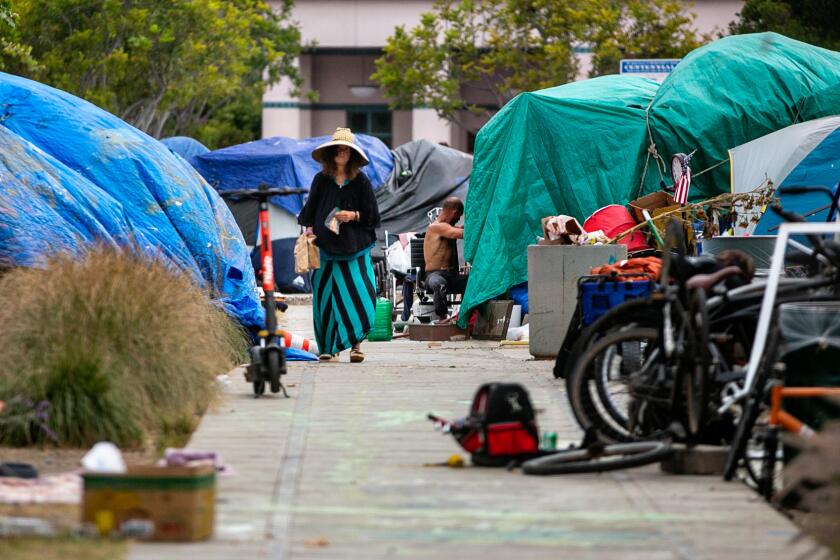Karen Bass vow on homelessness: Set achievable, ambitious goal and ‘hold myself to it’

- Share via
On a tour of the Los Angeles LGBT Center in Hollywood on Tuesday, mayoral candidate Karen Bass seemed alternately impressed and flabbergasted.
She was impressed by the programs, the devoted staff and the center’s mission of providing a full slate of healing social services — and housing — to LGBTQ clients who have suffered trauma, discrimination and homelessness.
But she was flabbergasted by the tangled, inept bureaucracies that dragged out the construction and opening of the center and drove up costs.
Joe Hollendoner, the agency’s chief executive, said it often got conflicting advice from multiple government agencies. At one point, a requirement that the center pay for a bike lane on its portion of Santa Monica Boulevard devolved into a months-long nightmare involving the Los Angeles Department of Water and Power and the relocation of power lines, leading to more delays and higher costs.
Bass shook her head, then asked:
“Did you find anybody within the city that was really committed to pushing this through for you?”
Yes, she was told. Sarah Dusseault, who was working for the area councilman at the time and is now a member of the Los Angeles Homeless Services Authority Commission, helped find money to offset some of the cost increases caused by delays.
But overall, Hollendoner said, getting the doors open last year to provide urgently needed services “was just quite challenging.”
Caruso wants thousands of tiny homes and ‘sleeping pods.’ Bass proposes some interim units, while pushing to expand vouchers, motel rooms, apartments and incentives to landlords.
Youth services director Lisa Phillips told Bass that a government contract for housing pays only a fraction of the true cost. And for 25 youths with mental health and substance abuse needs, Phillips said, there’s a contract that covers 1.5 staffers working a total of two hours a week, and “it’s just not reasonable.”
“It’s not safe,” Bass said.
The congresswoman had one more notable reaction on our tour. We were taken to the center’s senior housing building, which opened last year and houses 98 LGBTQ people. The project was funded in part by voter-approved Proposition HHH, which has made for many a headline about high costs and the snail’s pace of construction in the midst of a humanitarian crisis.
We were told the cost per unit ended up at about $522,000, to which Bass offered a one-word reply:
“Jesus.”
And $522,000 is well below the current cost-per-unit average of HHH housing. If Bass gets the best of Rick Caruso on election day next month and becomes mayor, trimming costs and delays in a city with 40,000 or so homeless people will be the beastly challenge she wakes up to each day.
She’s already put her neck out there, vowing to house 15,000 people in her first year in office. Caruso, meanwhile, has matched and doubled that number.
Voters are tired of broken promises, especially on homelessness. And yet, would anyone want timid appeals and modest proclamations from either Bass or Caruso?
“Trust me, I’m not naive about what stands before me,” Bass told me as we headed toward downtown for another housing tour.
If temporary housing through the Roomkey and Homekey projects doesn’t get renewed, she said, that will put thousands of people back on streets where serious addiction and severe mental illness are common.
Then come the relationship challenges. With county officials. With an incoming controller and city attorney. With a City Council that could be moving further to the left and less inclined to compromise on Bass’ or anyone else’s agenda.
“I think it’s going to be a rocky road,” Bass said, but she quickly added that she relishes the challenge.
As we passed one encampment after another, she said she wants to do what is “reasonable and achievable, but still very ambitious. And hold myself to it.”
There is a lot that’s sensible in her plan; not a lot that’s new and radical.
More and better homelessness prevention. Lower-cost housing through nonprofit community land trusts. Streamlining approval of housing and expediting construction. Better use of emergency housing vouchers. Repurposing of commercial buildings and more accessory dwelling units and modular design.
But Bass insists much of the problem is a disjointed response and a leadership vacuum that results in the kind of nonsense we were told about at the LGBT Center.
“You shouldn’t have to be run around to 20 different departments,” she said. There ought to be a “centralized system,” and she wants “leadership in the departments that understands things need to move as fast as possible.”
In Bass’ vision, her many years of collaboration in Sacramento and Washington would be the honey that draws city, county, state and federal officials together with a task of delivering fixes rather than excuses, and maybe the congressional reps can be tasked with delivering earmarked money for specific regional projects.
There’s just no alignment as things are, Bass said. No coordination or urgency. And she hasn’t given up on the idea of retooling the Los Angeles Homeless Services Authority, which serves city and county and has much responsibility and little authority in a system no one is in charge of.
It’s only fair to note that these are things that have been stated, mulled and in some cases rejected by others.
But that doesn’t mean a better day is beyond reach. As Bass puts it, for all the challenges, nothing stands in the way of better leadership.
Get the lowdown on L.A. politics
Sign up for our L.A. City Hall newsletter to get weekly insights, scoops and analysis.
You may occasionally receive promotional content from the Los Angeles Times.
At the Care First Village named for county Supervisor Hilda Solis, Bass liked what she saw. Here, on what had been vacant county property near the downtown jails, it took just a few months late in 2020 to build a 232-home village out of shipping containers. Most of the money was from federal coronavirus relief funds and the cost per unit worked out to about $220,000.
Bass told me she has about 1,000 tiny homes in her plan, but she prefers this design and hopes to duplicate it. The units are roomier and have bathrooms, and social services are on-site.

In one unit, Bass met with Judith Brown, who moved inside in August. She had been at a shelter and lived in her car after losing a job and being treated for cancer.
“Now I have my own bathroom, my own privacy,” Brown said.
“You look fabulous,” Bass told her.
“This is a blessing,” Brown said. “This place is awesome.”
::
On my way home, I made a stop in Highland Park, just off the Arroyo Seco Parkway at Avenue 64. There’s been a homeless encampment there for years, and now a tiny home village is nearby. Between the two is a house with a Caruso sign.
I rang the doorbell and the man who answered, a carpenter, said he thinks Caruso is the guy to address homelessness.
I reached out to Caruso, who said he’d go back with me to visit the carpenter.
When that comes together, you’ll read about it here.
Steve.lopez@latimes.com
More to Read
Sign up for Essential California
The most important California stories and recommendations in your inbox every morning.
You may occasionally receive promotional content from the Los Angeles Times.















